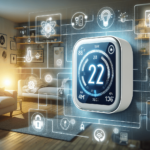In today’s increasingly connected world, the utilization of smart plugs has become a common practice. These versatile devices offer convenience and efficiency, allowing users to remotely control their electronic devices. However, amidst this technological ease, it is essential to acknowledge the privacy implications associated with using smart plugs. From potential data breaches to unauthorized access, this article aims to shed light on the critical privacy considerations that arise when incorporating smart plugs into your everyday life.
Data Collection by Smart Plugs
Types of Data Collected
Smart plugs are devices that allow you to control your electronics remotely through a mobile app or voice assistance. They not only bring convenience and energy efficiency to our homes but also collect valuable data. The types of data collected by smart plugs can vary but generally include information such as energy consumption, usage patterns, and device status. This data helps users monitor their energy usage, identify potential areas for improvement, and make more informed decisions about their energy consumption.
Purpose of Data Collection
The primary purpose of data collection by smart plugs is to provide users with insights into their energy consumption and help them make more informed choices regarding their usage. By collecting data on energy consumption, smart plugs enable users to track their usage trends, identify high-energy-consuming devices, and find opportunities for energy-saving. This data can be instrumental in reducing utility bills, conserving resources, and promoting sustainability.
Extent of Data Collection
The extent of data collection by smart plugs depends on the specific model and brand. While some smart plugs collect only basic energy consumption data, others may collect more detailed information such as device usage patterns, voltage fluctuations, and power surges. It is essential to review the features and specifications of different smart plugs to understand the extent of data collection they offer.
Storage of Collected Data
The data collected by smart plugs is usually stored either locally on the device or on cloud-based servers. Local storage ensures that the data remains within the user’s control and is not accessible to third parties. On the other hand, cloud storage provides the advantage of easy access and syncing across multiple devices but may raise concerns about data security and privacy. It is crucial to understand where and how the collected data is stored and ensure that appropriate security measures are in place to protect it.
Potential Security Risks
Unauthorized Access to Smart Plug
One of the primary concerns regarding smart plug usage is the risk of unauthorized access. Since smart plugs connect to your home’s Wi-Fi network, it is essential to ensure that your network is secure and protected by a strong password. A weak or easily vulnerable network can open the door for hackers to gain access to your smart plugs and potentially control your devices remotely. It is crucial to follow best practices for securing your home network, such as regularly updating your router firmware and using unique, strong passwords for your network.
Privacy Breaches through Connected Devices
Smart plugs often integrate with other connected devices in your home, such as smart speakers or home automation systems. While this integration brings added convenience, it also increases the risk of privacy breaches. If a connected device that interacts with your smart plug has inadequate security measures, it could potentially expose your data to unauthorized access. It is important to ensure that all connected devices have proper security protocols in place and regularly update their firmware to minimize these risks.
Exploitation of Vulnerabilities
As with any technology, smart plugs may contain vulnerabilities that can be exploited by hackers. Manufacturers regularly release firmware updates to address these vulnerabilities and improve security. However, it is crucial for users to stay vigilant and install updates promptly to ensure that their smart plugs are protected against potential security threats.

Data Sharing with Third Parties
Manufacturer and Service Provider Agreements
When using smart plugs, it is important to consider the agreements between the manufacturer and service providers. These agreements may outline the terms and conditions regarding data collection and sharing. It is advisable to review the manufacturer’s privacy policy and terms of service to understand how they handle your data and whether they share it with third parties. Look for transparency and clear statements regarding data usage, sharing, and protection.
Implications of Sharing Data
Sharing data collected by smart plugs with third parties has both advantages and potential risks. On one hand, sharing data can enable service providers and manufacturers to improve their products and services based on user behavior and preferences. It can also facilitate the development of smarter energy management systems. However, it is essential to weigh these benefits against the privacy implications and ensure that any sharing is done with explicit consent and anonymized data to protect user privacy.
Transparency and Consent
Transparency in data sharing practices is crucial for maintaining user trust. Smart plug manufacturers and service providers should clearly communicate their data sharing practices, including what data is collected, who it is shared with, and how it is used. Users should have the option to provide explicit consent for data sharing and have control over their personal information. It is important to choose manufacturers and service providers that prioritize transparency and respect user privacy.
Location Tracking
Use of Geolocation Data
Some smart plugs may collect geolocation data to provide additional features and functionality. Geolocation data enables smart plugs to adjust energy usage based on the user’s location or provide location-based automation. While the use of geolocation data can enhance user experience, it also raises privacy concerns. Users should have the ability to control when and how their geolocation data is collected and used, and manufacturers should provide transparent information on how this data is handled and protected.
Tracking Behavior and Usage Patterns
Smart plugs that collect data on device usage patterns can provide valuable insights into user behavior and preferences. This data can contribute to the development of more user-friendly and efficient smart plug features. However, tracking behavior and usage patterns also raises concerns about privacy and surveillance. Users should have the option to opt out of data collection for behavior tracking and ensure that their sensitive information remains confidential.
Potential for Surveillance
The collection and storage of data by smart plugs can potentially enable surveillance if used maliciously or accessed by unauthorized parties. While the primary purpose of data collection is to improve energy efficiency and user experience, it is crucial to be aware of the potential risks. Consumers should choose smart plugs from reputable manufacturers that prioritize strong security measures and provide clear information on how they protect user privacy.

Smart Plug Mobile Applications
Permissions Required
Smart plug mobile applications often require certain permissions to function properly. These permissions can vary but commonly include access to the user’s Wi-Fi network, location data, and device information. It is important to review the permissions requested by the mobile app and ensure they are necessary for the app’s functionality. Granting excessive permissions can increase the risk of unauthorized access or data breaches.
Collection and Use of Personal Information
Mobile apps used in conjunction with smart plugs may collect personal information such as email addresses, usernames, and device identifiers. It is important to review the app’s privacy policy and understand how your personal information is collected, used, and protected. Look for apps that provide clear information on data handling practices and ensure that your personal information is encrypted and stored securely.
Security of Mobile App Data
The security of mobile app data is essential to protect user privacy. Smart plug mobile apps should use secure encryption protocols to transmit and store data, and they should regularly update their security measures to address any vulnerabilities. It is advisable to choose apps from well-established developers that prioritize security and have a track record of promptly addressing any security concerns.
IoT Integration and Data Aggregation
Access to Other Connected Devices
Smart plugs are often part of a larger ecosystem of connected devices in a household, commonly known as the Internet of Things (IoT). This integration allows for enhanced automation and control. However, it is important to consider the potential privacy implications of granting smart plugs access to other connected devices. By gaining access to devices such as security cameras or voice assistants, smart plugs may inadvertently collect additional personal information. Users should be cautious when granting access permissions and ensure that data sharing and integration are performed securely.
Cross-Platform Data Aggregation
Because smart plugs interact with various devices and platforms, there is the potential for cross-platform data aggregation. Data collected by smart plugs could be combined with data from other sources, such as smart home hubs or energy companies, to create a comprehensive profile of the user’s habits and behavior. While this aggregation can provide personalized experiences, it also raises concerns about data privacy and the potential for profiling. Users should have the ability to control and limit the sharing of their data across platforms.
Risk of Profiling
As data from smart plugs and other connected devices are aggregated, there is a risk of profiling. Detailed information about energy consumption patterns, device usage, and personal routines can be used to create profiles that reveal personal habits, preferences, and even vulnerabilities. This profiling may lead to discriminatory practices or the exploitation of personal information for targeted marketing purposes. It is important for users to be aware of these risks and have control over the collection and use of their data.

Data Use for Targeted Marketing
Monitoring Energy Consumption
One of the primary uses of data collected by smart plugs is to monitor energy consumption. By analyzing the collected data, service providers or manufacturers can identify energy-saving opportunities and provide personalized recommendations to users. While this can be beneficial in promoting energy efficiency, it is important for users to have control over how their data is used and ensure that it is not exploited for targeted marketing purposes without their informed consent.
Personalized Advertisements
The data collected by smart plugs can provide insights into user behavior and preferences, which may be utilized for targeted marketing purposes. For example, if a smart plug detects usage patterns that indicate a user’s interest in specific electronics, it could result in the delivery of personalized advertisements or product recommendations. While personalized advertisements can enhance user experience, it is important for users to have control over the use of their data for marketing purposes and the ability to opt out if desired.
Data Monetization
Data collected by smart plugs has the potential to be monetized by manufacturers, service providers, or third-party entities. This data can provide valuable insights into user behavior and energy consumption trends, which can be leveraged for market analysis or sold to interested parties. Users should be aware of this potential data monetization and have the ability to provide explicit consent or opt-out of such practices. Transparency and control over data usage are crucial in ensuring user privacy and preventing the unauthorized exploitation of personal information.
Legal and Compliance Considerations
General Data Protection Regulation (GDPR)
The General Data Protection Regulation (GDPR) is a comprehensive data protection law implemented by the European Union (EU). It sets guidelines and requirements for the collection, processing, and storage of personal data. If you are using smart plugs in an EU member state, it is vital to ensure that the manufacturer and service provider comply with GDPR regulations to protect your personal information and privacy rights.
California Consumer Privacy Act (CCPA)
The California Consumer Privacy Act (CCPA) is a privacy law that provides Californian residents with specific rights regarding the collection and use of their personal information. Smart plug users in California should review the privacy policies of manufacturers and service providers to understand how their data is handled and whether it complies with CCPA regulations. This includes the right to opt-out of data sharing or request the deletion of their personal information.
Other Privacy Laws and Standards
In addition to GDPR and CCPA, there may be other privacy laws and standards specific to your jurisdiction. It is important to be aware of any local regulations that govern the collection and use of personal data. Research the relevant laws and ensure that smart plug manufacturers and service providers adhere to these obligations to protect your privacy rights.

Minimizing Privacy Risks
Researching Smart Plug Manufacturers
When choosing a smart plug, it is important to research the manufacturer’s reputation and commitment to privacy. Look for manufacturers with a track record of prioritizing user privacy, implementing strong security measures, and providing transparent information about their data handling practices. Reviews and user experiences can also provide valuable insights into the security and privacy features of different smart plugs.
Reviewing Privacy Policies
Before using a smart plug, thoroughly review the manufacturer’s privacy policy. Pay attention to how they collect, use, and share your data, as well as the security measures they have in place to protect it. Look for privacy policies that clearly state how your data is handled, provide choices for data sharing and opt-outs, and ensure the use of encryption and other security measures to safeguard your information.
Securing Smart Plug Connections
To minimize privacy risks, it is crucial to secure the connections between your smart plugs, Wi-Fi network, and mobile app. Start by securing your home network with a strong and unique password and regularly updating the router firmware to protect against vulnerabilities. Ensure that both the mobile app and smart plugs are running the latest firmware versions, as these often include security updates. Additionally, consider enabling two-factor authentication for your smart plug accounts to add an extra layer of protection.
Privacy Education and Awareness
Understanding Privacy Risks
To protect your privacy when using smart plugs, it is important to have a comprehensive understanding of the privacy risks involved. Educate yourself about the potential risks associated with data collection, sharing, and integration. Stay informed about current privacy practices and emerging trends in the smart home industry. By being aware of the privacy considerations, you can make informed decisions and take appropriate measures to protect your data.
Educating Users
Privacy education is not limited to individual users only. Manufacturers, service providers, and government agencies need to actively educate users about privacy risks, best practices, and the importance of data protection. By providing clear guidelines and user-friendly educational resources, the industry can empower users to make informed decisions and take necessary steps to protect their privacy.
Advocacy for Privacy Standards
Privacy advocacy plays a crucial role in shaping industry practices and promoting responsible data handling. Users can advocate for stronger privacy standards by supporting organizations that focus on privacy rights and encouraging manufacturers and service providers to prioritize user privacy. Public support and demand for privacy-friendly products and practices can drive the industry towards better privacy protection measures and help establish stronger privacy standards for smart plugs and connected devices.
In conclusion, while smart plugs offer numerous benefits in terms of energy efficiency and convenience, it is important to be aware of the privacy considerations associated with their use. By understanding the types of data collected, potential security risks, and privacy implications, users can take proactive steps to protect their personal information. Choosing reputable manufacturers, reviewing privacy policies, securing connections, and staying informed about privacy laws and standards all contribute to establishing a more privacy-conscious smart plug ecosystem. With privacy education and advocacy, we can shape the future of smart homes and ensure that privacy remains a priority.











